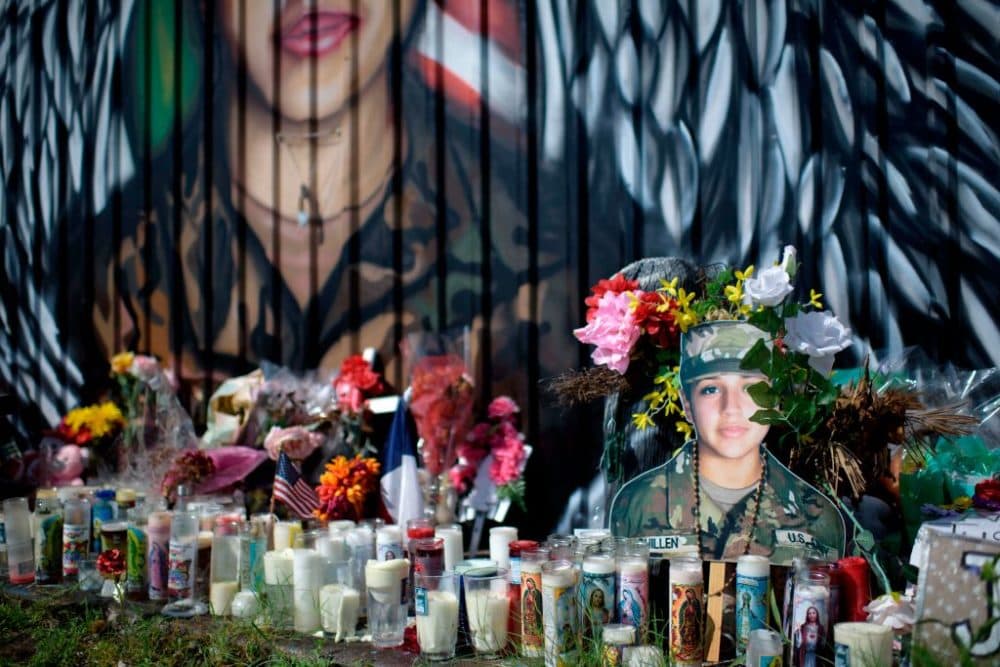Advertisement
Commentary
Until our armed forces address a legacy of assault, I won't be celebrating Veterans Day

I still haven’t figured out how to celebrate Veterans Day. I have deeply complicated feelings about my time in the service, a time that included both the best and worst experiences of my life.
I joined the Army when I was 17 years old. During my two years in the service, I accomplished a lot. I received two Army achievement medals, was promoted to the rank of specialist (within 18 months) and was appointed to be my company’s Guidon bearer. I completed Airborne School and became a paratrooper — my favorite part of my military experience. I also met many incredible people, some of whom are still good friends.
But it’s difficult to reminisce and celebrate these things, because of the painful experiences I endured. During my time in service I survived numerous incidents of sexual violence, also know as Military Sexual Trauma (MST).
The sexual harassment started almost immediately, when I arrived to my unit. Within my first week, I heard that I was “fresh meat” from a friend — he explained that several soldiers were talking about how they wanted to hook up with me. My fellow soldiers asked “what I liked in bed,” sent texts pressuring me to send nude photos and regarded my accomplishments as rewards for performing oral sex. I didn’t know how to respond to any of it, so I just stayed quiet.
I experienced abuse as a kid and this made me hesitant to confront people or make a report — I didn’t trust the legal system to work, because it hadn’t when I was an adolescent. When I heard the sexist things people said about female soldiers who did report incidents of sexual harassment, it only solidified my decision to stay quiet. There were no repercussions for the abuse, and the survivors faced backlash for reporting. How could I trust leaders to take action on my behalf?
When I heard the sexist things people said about female soldiers who did report incidents of sexual harassment, it only solidified my decision to stay quiet.
I felt on edge. I felt isolated. I developed an eating disorder and tried to cope by harming myself. I had few friends during this dark time — and one took advantage of my poor mental health and raped me. Once again, I chose not to report the assault. I feared doing so would require hospital workers to carefully examine my body for an evidence collection kit, which would have revealed my scars from self-harm.
I had internalized stigma about mental health. I believed that seeking support — whether that meant reporting my rape or getting mental health treatment — would lead to my discharge from the service. At the time, I couldn’t see myself anywhere else. I had no back up plan. So, I kept quiet.
Ultimately, it was the fear that I was in danger of taking my own life that finally pushed me to come forward — to file a report.
My story is not unique. You’ll see many of the same elements present in the stories of other countless survivors. We’ve known for decades (starting with the 1991 Tailhook scandal) about the rape culture that exists within the ranks of our armed forces, the ineffective reporting and legal system managing these cases, and the lack of resources for survivors during their time in service.
Each successive scandal has led to investigations, some legal action being taken against the perpetrators and even restructuring of the reporting and legal process. So why does this keep happening?
One problem is that military commanders — who often lack legal training — still make important decisions about which cases move forward and which don’t. Since 2013, there has been a bill that would move these cases outside the chain of command to criminal justice attorneys. The newest version of the bill is known as the Military Justice Improvement and Increasing Prevention Act of 2021.
It may finally pass, in part due to the murder of U.S. Army Soldier Vanessa Guillen. She didn’t report incidents of sexual harassment prior to her death, because she believed the reporting process would fail her. I wept when I read about her parents recounting her experience, because it was so familiar to my own.
After I finally filed a complaint, I was referred to the medical retirement discharge process. It took eight months for my discharge to be completed. During that time, I still had to occasionally work with my abuser. After I left my company, I learned that he had been returned to his old position, as if nothing had happened. When I called my battalion’s legal team, I was told that they had referred my perpetrator for a unit transfer, but because the decision came down to my battalion commander, nothing could be done.
Since 2013, there has been a bill that would move these cases outside the chain of command to criminal justice attorneys
Had the proposed legislation — the Military Justice Improvement Act — been a law during my time in service, the decision about what would happen to the person who assaulted me, would have been enforced by a legal official. It would’ve shown that there are consequences to sexually attacking a fellow soldier. It would have provided some level of prevention of military sexual trauma, even if it would only address one factor of the military’s rape culture.
This legislation must pass, but it ought to be only the beginning of a larger overhaul, because we know punitive measures alone won’t prevent sexual violence.
The ultimate goal is to eliminate rape culture from the military. Service members shouldn’t have to live in fear of their own comrades in arms, and we shouldn’t rest until sexual violence in our armed forces is a thing of the past.
Until this happens, I don’t think I can celebrate Veterans Day. Despite the pride I have in my accomplishments during my time in service, I don’t think I can celebrate until the abuse stops. The knowledge that no one else will have to suffer as I’ve suffered will be the greatest accomplishment.
